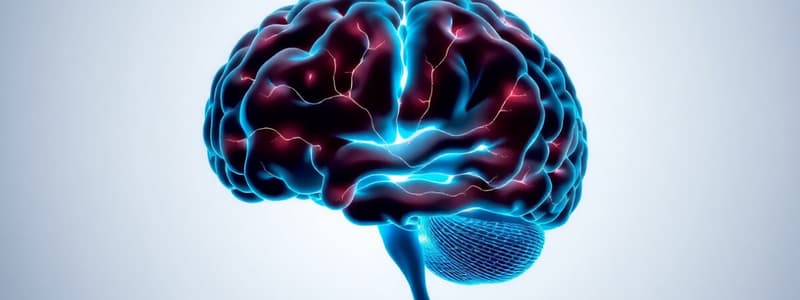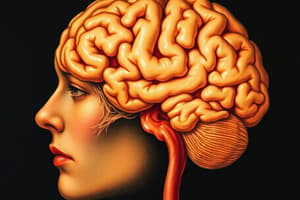Podcast
Questions and Answers
What type of response does the hypothalamus coordinate during stress?
What type of response does the hypothalamus coordinate during stress?
- A long-term behavioral response
- A purely emotional response
- A rapid autonomic and slower endocrine response (correct)
- A decentralized response
What is the role of cortisol in the physiological response to stress?
What is the role of cortisol in the physiological response to stress?
- Facilitating longer-term adaptation to stress (correct)
- Providing immediate energy for muscles
- Reducing heart rate during stress
- Initiating emotional responses
Which part of the nervous system is primarily involved in the rapid response to stress?
Which part of the nervous system is primarily involved in the rapid response to stress?
- Central nervous system
- Parasympathetic nervous system
- Sympathetic nervous system (correct)
- Peripheral nervous system
What term describes the body's adaptive state when responding to environmental stressors?
What term describes the body's adaptive state when responding to environmental stressors?
Which system is responsible for the slower, chronic responses to stress?
Which system is responsible for the slower, chronic responses to stress?
What is the primary role of the hypothalamus in stress response?
What is the primary role of the hypothalamus in stress response?
What does the concept of allostasis refer to?
What does the concept of allostasis refer to?
Which system is primarily involved in the physiological response to stress?
Which system is primarily involved in the physiological response to stress?
How does perception of stressors influence stress response?
How does perception of stressors influence stress response?
What does allostatic load measure?
What does allostatic load measure?
Which receptors are primarily involved in the sympathetic innervation of the heart?
Which receptors are primarily involved in the sympathetic innervation of the heart?
What is the effect of the parasympathetic nervous system on the heart's nodes?
What is the effect of the parasympathetic nervous system on the heart's nodes?
Which part of the heart does the sympathetic nervous system NOT innervate?
Which part of the heart does the sympathetic nervous system NOT innervate?
What neurotransmitter is released by the sympathetic nervous system to act on the heart?
What neurotransmitter is released by the sympathetic nervous system to act on the heart?
In a resting human, which system is primarily active in regulating heart rate?
In a resting human, which system is primarily active in regulating heart rate?
Which statement is true regarding an isolated human heart?
Which statement is true regarding an isolated human heart?
Which of the following structures receives innervation from both the sympathetic and parasympathetic nervous systems?
Which of the following structures receives innervation from both the sympathetic and parasympathetic nervous systems?
What impact does the activation of β1-receptors have on the myocardium?
What impact does the activation of β1-receptors have on the myocardium?
If the parasympathetic nervous system is stimulated, what would be expected to happen to the heart rate?
If the parasympathetic nervous system is stimulated, what would be expected to happen to the heart rate?
What is the heart rate at rest due to the dominant parasympathetic activity?
What is the heart rate at rest due to the dominant parasympathetic activity?
What effect does inspiration have on heart rate during respiratory sinus arrhythmia?
What effect does inspiration have on heart rate during respiratory sinus arrhythmia?
What is the heart rate during expiration recorded in the experiment?
What is the heart rate during expiration recorded in the experiment?
Which reflex mechanism is primarily responsible for the increase in heart rate during inspiration?
Which reflex mechanism is primarily responsible for the increase in heart rate during inspiration?
What might the absence of respiratory variations in heart rate indicate in patients?
What might the absence of respiratory variations in heart rate indicate in patients?
What happens to heart rate during the cardiac dive response when a person is submerged in ice-cold water?
What happens to heart rate during the cardiac dive response when a person is submerged in ice-cold water?
What is the heart rate on inspiration as recorded in the figure?
What is the heart rate on inspiration as recorded in the figure?
What is one of the consequences of respiratory sinus arrhythmia for gaseous exchange in the lungs?
What is one of the consequences of respiratory sinus arrhythmia for gaseous exchange in the lungs?
What is the total resting heart rate when both sympathetic and parasympathetic activities are accounted for?
What is the total resting heart rate when both sympathetic and parasympathetic activities are accounted for?
What physiological role does the Bainbridge reflex serve during inspiration?
What physiological role does the Bainbridge reflex serve during inspiration?
Flashcards
Stress Response: Goal
Stress Response: Goal
The body's response to stress involves rapid adjustments to restore stability and increase survival chances.
Homeostasis
Homeostasis
The body's way of maintaining a stable internal environment, like keeping body temperature steady.
Allostasis
Allostasis
The body's ability to adapt to challenges, changing physiology to cope with stress.
Allostatic Load
Allostatic Load
Signup and view all the flashcards
Adrenal Gland Role in Stress
Adrenal Gland Role in Stress
Signup and view all the flashcards
Physiological Response to Stress
Physiological Response to Stress
Signup and view all the flashcards
Hypothalamus
Hypothalamus
Signup and view all the flashcards
Autonomic Nervous System Response
Autonomic Nervous System Response
Signup and view all the flashcards
Endocrine System Response
Endocrine System Response
Signup and view all the flashcards
Heart rate with sympathetic activity
Heart rate with sympathetic activity
Signup and view all the flashcards
Heart rate with parasympathetic activity
Heart rate with parasympathetic activity
Signup and view all the flashcards
Dominant influence on resting heart rate
Dominant influence on resting heart rate
Signup and view all the flashcards
Heart rate during inspiration
Heart rate during inspiration
Signup and view all the flashcards
Heart rate during expiration
Heart rate during expiration
Signup and view all the flashcards
Respiratory sinus arrhythmia (RSA)
Respiratory sinus arrhythmia (RSA)
Signup and view all the flashcards
How does RSA affect heart rate during inspiration?
How does RSA affect heart rate during inspiration?
Signup and view all the flashcards
How does RSA affect gas exchange?
How does RSA affect gas exchange?
Signup and view all the flashcards
Mechanism of RSA during inspiration
Mechanism of RSA during inspiration
Signup and view all the flashcards
What does the lack of RSA indicate?
What does the lack of RSA indicate?
Signup and view all the flashcards
What does the autonomic nervous system control in the heart?
What does the autonomic nervous system control in the heart?
Signup and view all the flashcards
How does the sympathetic nervous system affect the heart rate?
How does the sympathetic nervous system affect the heart rate?
Signup and view all the flashcards
How does the parasympathetic nervous system affect the heart rate?
How does the parasympathetic nervous system affect the heart rate?
Signup and view all the flashcards
What is the normal resting heart rate for humans?
What is the normal resting heart rate for humans?
Signup and view all the flashcards
At what rate would an isolated human heart beat?
At what rate would an isolated human heart beat?
Signup and view all the flashcards
Which branch of the autonomic nervous system is more active at rest?
Which branch of the autonomic nervous system is more active at rest?
Signup and view all the flashcards
Study Notes
Physiological Response to Stress
- Stressors can be physical or psychological, internal or external
- The body's perception and processing of stressors significantly impacts the response
- The stress response is designed for rapid return to a stable state for survival
- Allostasis: the physiological changes (neuroendocrine, autonomic, immune) that occur in response to challenges to homeostasis.
- Allostatic load: accumulation of these allostatic changes - a measure of stress effects on humans
- Physiological response to stress has both rapid (acute) and slower (chronic) components
- Stressors can be perceived differently resulting in varying responses
Coordinated Response to Stress
- Stressors trigger a coordinated response involving the higher brain centers (hypothalamus)
- The hypothalamus activates both the autonomic nervous system and the endocrine system
- The autonomic nervous system triggers a fast response
- The endocrine system (anterior and posterior pituitary) trigger a slower, more chronic response
- The coordinated response involves the sympathetic nervous system, parasympathetic nervous system, and the endocrine system
Role of the Hypothalamus
- The hypothalamus is a crucial hub in the stress response
- It connects the higher brain centers, autonomic nervous system, and the endocrine system
- It coordinates responses to stressors through the locus ceruleus, anterior pituitary, and the adrenal gland
- It plays roles in the RAS (reticular activating system) and spinal cord signals.
- The hypothalamus is the central integrator of the stress response.
Learning Objectives
- Review autonomic nervous system structure and function
- Explain the role of the endocrine and nervous systems in regulating organ systems
- Explain the hypothalamus' role in coordinating outputs from the nervous system and pituitary glands
- Explain the general neuroendocrine response to stressors
- Describe the adrenal gland's role in stress response
- Understand the impact of respiration on heart rate
- Be aware of the mechanisms for the Bainbridge reflex.
- Recognize variations in heart rate during the stress response, such as Respiratory Sinus Arrhythmia
- Explain the cardiac dive response.
Stressors
- Both physical and psychological factors can trigger stress
- Stressors have internal and external origins
- An individual's perception and processing of stressors greatly affect the outcome of the response.
- The individual's perception and processing of stressors significantly impact the stress response.
Studying That Suits You
Use AI to generate personalized quizzes and flashcards to suit your learning preferences.




